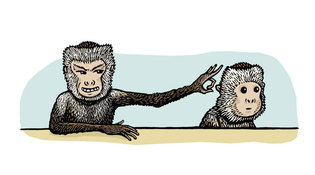 loading
loading
FindingsSpite and malice and monkeysHumans aren’t the only species prone to immaturity.  Gregory NemecView full imageThough they are distant primate relatives of humans, capuchin monkeys show at least one important similarity to us: they appear to be capable of spite. This discovery in a recent experiment caught Laurie Santos, a professor of psychology at Yale and director of its Comparative Cognition Laboratory, off guard. “We were pretty surprised,” she says. “To date, there’s little evidence that other species [besides humans] show anything like spite.” Santos, with two collaborators from Harvard, was investigating the evolutionary roots of punishment, which is thought to play a central role in the emergence of cooperative social groups. “We were interested in whether nonhuman primates share some of the cognitive mechanisms and psychological processes that allow our species to punish others,” she explains. The experiment examined how individual capuchin subjects responded to four different scenarios. Each centered on a tray of Fruity Pebbles cereal (a delicacy, at least to capuchins). In one scenario, a solitary subject monkey had access to a tray for five seconds, after which the tray was taken away. In another, the subject monkey watched a partner eating Fruity Pebbles behind a mesh screen that kept the monkeys separate. In a third scenario, both monkeys had access to the tray at first, but then the partner stole the tray. And in the final scenario, both monkeys had access at first, but then humans gave the tray to the partner. Subject monkeys who saw their partner steal the tray would punish the thief by yanking on a rope that spilled the Fruity Pebbles out of reach. But when humans gave the tray to the other monkey, the subject still yanked on the rope. “Capuchins fail to take intentionality into account when making punitive decisions,” the authors wrote in Evolution and Human Behavior. The finding doesn’t conclusively demonstrate spite; the authors say it’s possible that capuchins are inherently averse to inequality. But the willingness to punish when there’s no clear benefit fits both biological and psychological definitions of spite. This all-too-human trait may be one we inherited. Says Santos, “The psychological mechanisms that allow humans to be spiteful may not be as unique as we previously thought.”
The comment period has expired.
|
|